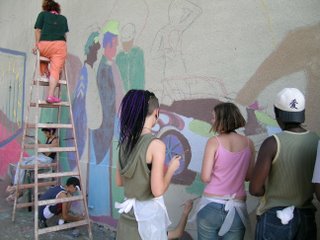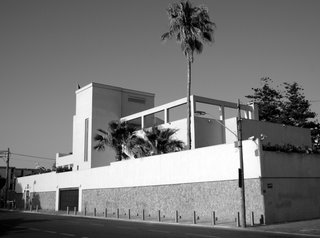Nasrallah the folk hero?
It's easy to misinterpret or otherwise abuse the information.
I do some community work in Ajami, the neighborhood where i live. I work with girls and young women, some of them from extremely impoverished homes, where they are faced with various forms of violence, drug abuse etc.
The majority of them are Palestinian girls, although they will not define themselves as such, they have very little political awareness, or... do they?
Yesterday, in spite of the very hot weather, we sat in the garden, in the shadow of a huge "toot" tree, drinking cold water and eating" majadara". Talking about this and that.
Thirteen year old Aisha* said; " You know Yudit, in the X store in "Gantamar" (a part of Ajami) they sell posters of Nasrallah, they have different sizes, i want to buy one to hang in my room. Nasrallah is the only one who cares about the Palestinians".
Sixteen year old pious Mervat* agreed with her, and spat on the photographs of fallen soldiers, on the "Yediot" front page she was holding while saying they were "maniakim". I knew she was waiting for my reaction. Would act in anger? Would i be distressed?
We started talking. Mervat told me she'd spoken yesterday to her sister, who lives in the Gaza strip with her children. Although the sister has a blue, Israeli id card, the sisters have not met for years, as her Gaza-born children cannot travel with her, and they cannot get an entry permit to Israel.
Mervat, who herself was born in the Gaza strip to an Israeli mother, carries an Israeli ID, so she cannot go to visit Gaza, to meet her family.
The only way the sisters can meet, is abroad. As people in the Gaza strip have little money, that road is open to few.
Mervat 's sister's home has been destroyed. They can talk only occasionally, when there is enough electricity to charge the batteries of the sister's cellphone. The sister and her children live with her husband's family now. All stay in one room. The children, traumatized by the noises, the loss of their home, the lack of hope, the poverty, the stress, find it difficult to cope.
Mervat is angry. she knows very little about politics and only occasionally watches the news. But she is certain of one thing : Nasrallah is the only one who cares about the Palestinians, he has given her hope. She sees him as an honest man with honor, a hero, not scared of the "zionists who kill our children".
Aisha agrees with her.
Then they say "don't worry Yudit, you are not like them, we know you are ok".
Two little girls from Ajami saying it more clearly, if we'd only listen "the Israeli emperor's new clothes are non-existent".
But we don't listen, or perhaps we don't want to listen. No, Aisha and Mervat are not dangerous extremists. what they see in the news upsets them, deeply. Hundreds of Lebanese civilians get killed, murdered. While all eyes are trained on Lebanon, no one pays attention to what is happening in the WestBank and the Gaza Strip where people are killed as well and infrastructure and houses destroyed.
Aisha and Mervat don't know much about the politics, the dynamics and the "expert opinions" of this or that (ex) general. In fact, they never watch the Israeli Hebrew language channels. They watch AlJezeera etc, where they see the violence, the horror, they talk to their relatives and they perceive one thing: Nasrallah makes promises which he keeps.
Whether that is true or not, doesn't play much of a role. they perceive it as true, honest and honorable.
Their lives in Jaffa are poor and they have few chances.
Aisha and Mervat are the future. They can change a lot, in any direction. We better listen to them and take them very seriously.
They are two very innocent well meaning and sensitive young girls.
They don't believe the Israeli version, they know they have very little to expect from life and if someone gives them hope, they'll take it up, with all the vigour of the very young.
*Not their real names






